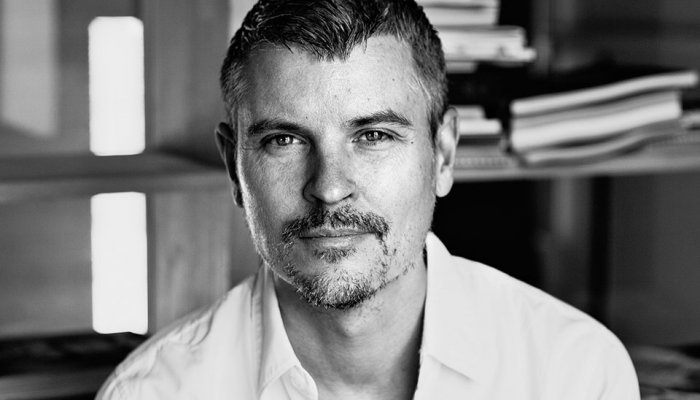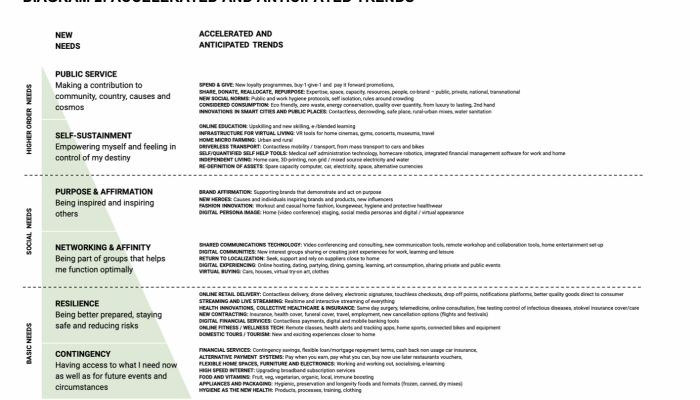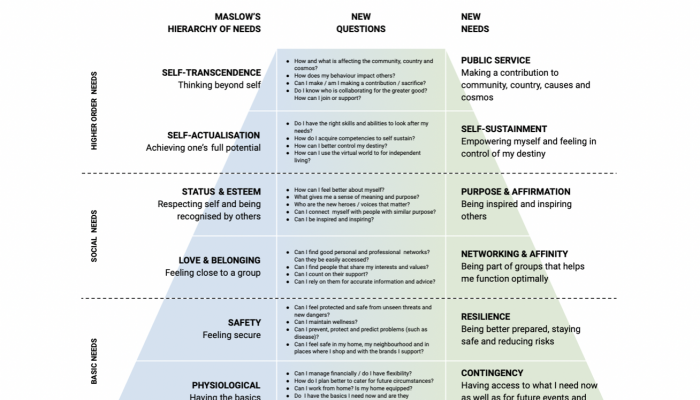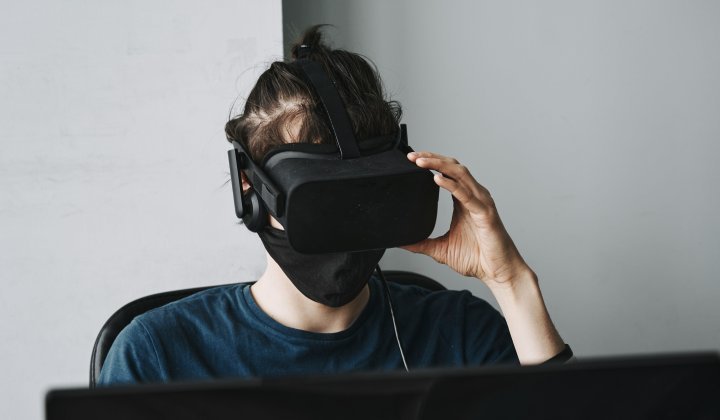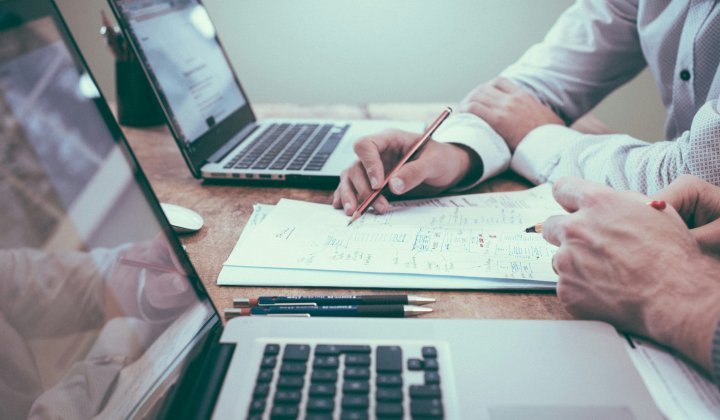Universal’s case is yet to unfold, but what we do know is that during catastrophes people’s needs shift and stick, and what is new becomes normal in a good portion of the market across segments and sectors. Questions change and different ways of doing things bring about new trends and accelerate those already underway. These trends are unstoppable, especially if customers’ experiences are better. In terms of banking, people already indicate a reluctance to returning to branches and to using cash following the crisis.
Brands adapting or innovating to meet the challenge will be front-runners. Beware, though, the brands that do not respond appropriately, are too late, or inaccessible. They will lag behind and find it hard to make a comeback.
Reimagining Maslow’s hierarchy
Maslow developed his first hierarchy of needs at a critical time in history as the Second World War came to an end (Diagram 1, left). We reimagine it now for a post-pandemic world with new questions and needs (Diagram 1, centre and right). We then list accelerated and anticipated trends (Diagram 2, right).
KEY ASSUMPTIONS
- Everyone operates on all levels, to a lesser or greater extent
- Points covered apply globally but require local adaptations
- All socio-economic groups are affected by new needs and trends, though behaviour may manifest differently
- Whilst a crisis can emphasise lower needs, all needs have and will surface
- Online now defines the future
DIAGRAM 1: NEW NEEDS POST CRISIS (Find this image at the end of the article and click to enlarge)
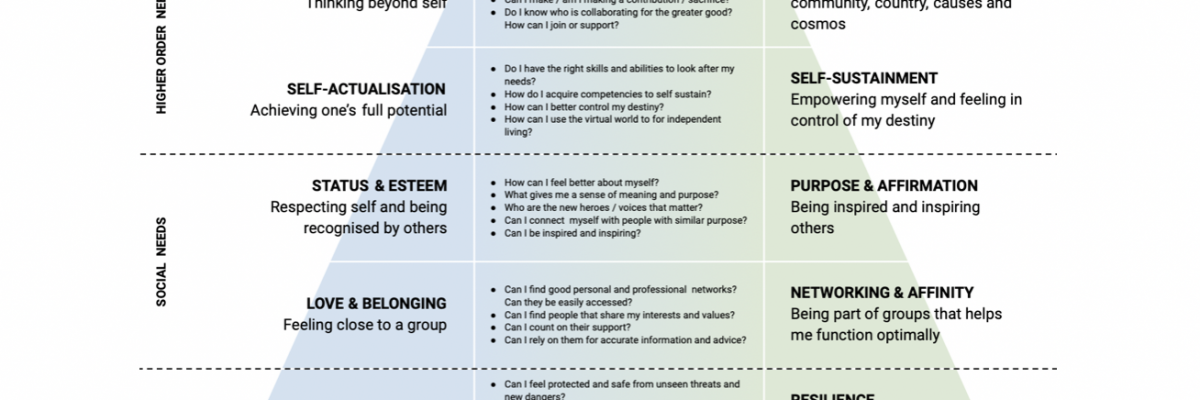
DIAGRAM 2: ACCELERATED AND ANTICIPATED TRENDS (Find this image at the end of the article and click to enlarge)
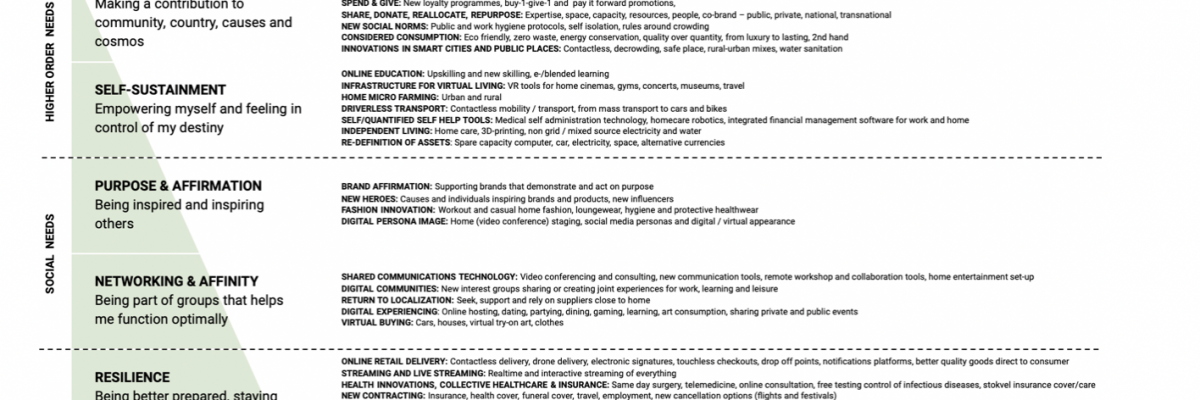
Contingency – having enough, being OK
Many consumers had insufficient financial buffers during the crisis, and what they thought was OK was not flexible enough. Enter opportunities for better financial planning (66% in China already say they want more) and flexible alternatives for loans, savings and insurance, including claiming against credit insurance, payment rescheduling, payment breaks, and pay-for-use only.
The ability to do multiple things at and from home will rise, especially work. Homes will have to be digital-ready (internet permitting), require high-speed broadband, an array of subscription services, new flexible space formats, furniture, and preventative maintenance.
Online school and university education will be hastened. Vodacom Africa’s e-learning platform increased fourfold to one million in six weeks.
A heightened value consciousness can be expected, as well as a change in food preferences (more organic, fresh, local, immune-boosting), and more attention to nutrition, exercise and personal care. Anticipate big weekly shops and contingency buying (cans, frozen, instant, powders, long-lasting), as well as a demand for high preservation packaging, appliances, and storage. Hygiene being the new health, customers will seek and share information on it, witnessed by phenomena like Cleancore, fueling a virtuous cycle for goods and services.
Resilience – coping, being prepared
People now feel a strong need to be informed, prepared and protective of family (inter-generational/extended), colleagues and employees. With risk taking on new meaning, insurance, health and funeral cover, travel, real estate, ticketing, and employment contracts must transform.
Customers will want brands that demonstrate resilience, take health/hygiene/safety measures and are helpful beyond the traditional remit. With digital low touch activities soaring, delivery is more significant, ever contactless in old and new categories (pharmaceuticals), propelling e-commerce. With opportunity for multi-store delivery, robot and drone use will expand (Singapore's first drone delivery took vitamins to a ship), as will blockchain tracking, supply chain innovation, electronic signatures and notifications platforms. Up will be direct-to-consumer farm and restaurant quality produce demand, premium and lower-priced gourmet home delivery, and pop-up, mobile and shared kitchens.
Live and interactive will mean the streaming of everything, from make-up consultations done previously in-stores in China now on WeChat, to fitness, meditation and yoga experts attracting millions globally. Digital banking will drive cashless and contactless transactions. In Kenya, MPESA, Africa’s 40 million payment platform, increased wallet limits for customers and lowered and waived fees for shops to deliberately enable cash contact-free, no-wait shopping.
More multiple physical and mental health issues will surface – telemedicine, virtual medical consultations and same-day surgery. Global health alerts and monitoring will proliferate. WHO and South Africa’s Health Alert – a multiple language health line – got information to billions globally during the pandemic.
Collectives should rise (insurance and healthcare), with Stokvels forced to develop cashless and ‘contractless’ formats and forums. International holidays will shrink for closer-to-home hotspots, making countries and regions rethink offerings for locals, not just foreigners.
Networking and affinity – getting, staying connected
Finding creative ways for social and professional connection and collaboration has led to spiked online usage. By March 2020, Zoom had 400 million users, enabling continued business meetings and conferences, church services, and classes in 90,000 schools in 20 countries.
Houseparty, the teenager app for talking and playing with friends, became the most downloaded app in 82 countries. UK beer company, Brewdog, turned its bars into virtual pubs with patrons raising a glass and having a laugh together. Netflix's spiraling popularity didn’t stop it from launching Netflix Party, letting customers watch movies together, chatting online.
People will buy virtually, from homes and cars to clothes and art, expanding connected technology and its derivatives. We will see more digitally shared experiences for weddings, funerals, dating, dining, gaming, learning and sports. Airbnb successfully tested hosts to offer virtual home experiences. Instagram Live hosts everything from “cook-alongs” to live house viewings and concerts, with users reaching one billion.
Paradoxically, whilst social and professional connections go online and global, people are increasingly buying and supporting locals. Affinity with home geography will create urban villages, more fresh markets and in-and-around township buying. Street and neighbourhood communities will mushroom for daily goods purchasing and sharing.
Purpose and affirmation – finding, following meaning
We know that brands that respond with purpose during a crisis, driving ideals instead of product, stay strong and thrive.
Nike performed best in the industry, beating digital sales estimates. “Playingfortheworld” emphasised its purpose, inspiring people through the power of sport. Using its platform and mobile app, it offered digital fitness, challenges by well-known athletic heroes, and customised live streamed workouts by master trainers, bringing everyone (young and old) together through video footage in kitchens, bathrooms, bedrooms and basements.
Post pandemic there will be new influencers and heroes. Customers will support who they trust and identify with, like key workers doing important things in local communities. Will we ever forget crowds gathering in streets to clap for first responders and frontliners in gratitude?
And increasingly to be seen and heard people will use blockbuster apps like TikTok (107 million downloads in February 2020) to become celebrities, amassing following and influence.
Luxury, redefined across product categories, will mean lasting. Fashion is likely to go functional, merging work/home/activewear with attention on protective clothing and antimicrobial textiles as big names have already done.
Home staging will be bound up with self-image as people do more business and socialising live from home with digital images, backdrops and avatars ballooning, alongside associated services.
Self-sustainment – independent, in control
People are going to feel good about themselves when they know how to do things, feel independent and in control, hence investing in blended learning and infrastructure to achieve this. Upskilling and “newskilling” in management, gardening, cooking, baking, sewing, self-care, music, art, languages and DIY will proliferate. Coursera saw an eightfold increase in enrolments for social science, personal development, arts and humanities courses since the outbreak. In one weekend, its ‘The Science of Well-Being’ enrolled a record 500,000 new students.
For leisure, expect more immersive experiences from travel, museums, concerts, and art galleries, to hiking and biking, with new connected home cinemas and gyms.
More independent living will involve non-grid and mixed source electricity and water, with access to 3D printing for instant supply and repairs. Snowballing will be home improvement materials (chemical-free), intelligent homes, “quantified self”/self-help tools, virtual assistants, and robotic cleaning aids.
On the medical front, hospital standard care and nursing homes will shift to home care with medical support and homes adapted for specific disease support.
Consumers will want to build or own assets they can monetise. Do they have spare computer processing power, electricity, or an idle car or tool to share? Perhaps capabilities they can sell online or assets that make them independent, like micro urban farming or tradable alternative currencies?
How many virtual goods will replace the need to have physical ownership, anyway?
We will see a shift from mass mobility to self-sufficient electrified transport, driverless cars, taxis, buses and trains, scaling autonomous/semi-autonomous contact-free technologies, and emphasis on hygiene and safety monitoring devices and protocols.
Public service – doing what’s right, right
People’s expectations of companies to serve the wider community have increased, like supporting the government, protecting employee’s health, favouring flexible working, nurturing supply chains, providing digital communication tools, collaborating and co-branding (even with competitors) in the interest of bettering service.
Brands that respond will gain market power.
Transcendence today means contributing to community, country, causes and cosmos, including volunteering and donations. Airbnb customers donated rooms to NHS workers in the UK. Activism and customers forming and joining movements online and physically will rise and will result in new influencers, buying powers and alternative selling channels.
Promotions and loyalty programmes with customers giving to charity, will spike. It will include “spend and give” (points donated in cash), “pay it forward” (buy for someone else) and “buy one, give one away”.
Considered consumption will replace mass or conspicuous consumption, with eco-friendly, zero-waste, green technologies ramping up. Anticipate last-for-life the new luxury, quality over quantity inflating second-hand clothing, cars or anything that can be reused, repurposed, refurbished or recycled. And more do-it-at-home to accomplish the above, plus save time, money and energy (think Sodastream).
Smart cities and public places, hotels, malls, entertainment and education centres will have to embrace new protocols in hygiene/safety, multi-purposing, low touch surfacing, de-crowding and water sanitation, and on demand smart buildings, spaces and services.
New social norms will be deep and long-lasting. It's no longer OK to cough in a supermarket or on a plane, or to be feverish at work. Self-isolation will not be taboo and will need a new product and service array. And, undoubtedly, consumers will be more concerned about how they impact others in the way they behave, buy and use goods.
Final words
The pandemic has shifted needs for new and emerging product and service categories and a good deal of them will be irreversible – a catalyst for innovation and new models. There will be a rebound in consumer behaviour, but no doubt we have entered new times where brands must adapt to a future already taking shape before our very eyes.
Further reading:
Sensing and Shaping the Post-COVID Era, BCG Henderson Institute (2020):
https://bcghendersoninstitute.com/sensing-and-shaping-the-post-covid-era-c282cd227a4f
Consumer Sentiment Evolves as the Next “Normal” Approaches, McKinsey & Company (2020):
https://www.mckinsey.com/business-functions/marketing-and-sales/our-insights/a-global-view-of-how-consumer-behavior-is-changing-amid-covid-19
The Era of The Public, Kantar Consulting (2020):
https://consulting.kantar.com/growth-hub/the-era-of-the-public/
Rediscovering the Later Version of Maslow’s Hierarchy of Needs, Mark E. Koltko-Rivera (2006):
https://academic.udayton.edu/jackbauer/Readings%20595/Koltko-Rivera%2006%20trans%20self-act%20copy.pdf
Online now defines the future, and Covid-19 did it
Covid-19 has condensed customer learning curves for innovative behaviour
Habits changed quickly during Covid-19 and are likely to stick
Sandra's bio for head of article:
Sandra Vandermerwe is currently an Extraordinary Professor at GIBS and was at IMD Switzerland and Imperial College Business School, London. She is a thought leader whose concepts and methodologies are used by corporations worldwide. She works globally with senior leadership to shape future customer-centric strategies, digital innovation and transformation. A prolific best-selling author and speaker, her work is based on decades of applied research and consulting.
David's bio for head of article:
After founding world-renowned Hyper Island – dubbed ‘the Oxbridge of Digital’ – David spent a decade in senior leadership positions at Vodafone, including five years as Global Brand Director. David has worked on numerous industry projects, corporate accelerators, research initiatives and executive training focusing on customer-centric digital innovation and business transformation. David is an associate of Trinity Business School in Dublin and a marketing director at NatWest Group.


